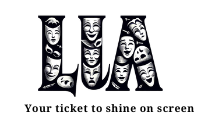Today, we started the class on time, and everyone joined and began talking to each other. Most likely, today is the last class of Level 1. After a short break, we will step into Level 2 – performing the scenes by mastering the craft. Anyways, I began the class by saying, ‘Today, we are going to discuss developing an actor’s workbook.’ This marks the 6th class in Level 1 of the full Online Acting Course with Lets Learn Acting institute.
Understanding what triggers emotions in actors.
When I mention developing an actor’s workbook, I’m not referring to listing all the lessons we’ve covered so far. Today, we are diving into the actual work of an actor. Up until now, we focused on the foundations necessary to become an actor. To becoming a singer—you need to sing. However, you don’t start directly with rhythms, tala, and shruthi; you first work on your voice, breath, and lung capacity. You understand the mechanics of your voice before learning to sing. Similarly, actors should follow a similar approach. We’ve built the foundation, and now we will delve into understanding the craft and other aspects.
Core Work of an actor
If you were to ask me what the core of an actor is, I would say it’s understanding one’s emotions. This involves knowing what triggers the actor, and his beliefs, conclusions, prejudices, past memories, fantasies, daydreams, and traumas they have experienced. We’ve discussed this numerous times before, in essence, we’re not just playing a character; we’re playing a human being. We’re portraying ‘you’ with the lines from the script. So, today, we will delve into discussions about emotions, beliefs, and more.
Understanding Stimuli
Stimuli refer to objects, people, things, sounds, or smells that affect you that created an emotion or feeling in you. It could be subtle or intense. For example, if you are afraid of cockroaches, the cockroach becomes a stimulus for fear. You have innumerous stimuli in your life; every person you’ve met is a stimulus, and you hold prejudices about them in some way. Your task now is to identify what affects you and how. Once you discover that, list it in your workbook.
Every day, as you are going your daily life from morning to evening, you should know the things and people that have affected you so that you can record them in your book. For example, if you met someone and that person made you angry, you should list it like this:
- The Experience: I met a person in a restaurant. I engaged in a conversation, and initially, I felt good, but in the end, I felt angry.”
- What Caused the Experience: Ask yourself, what is it that made me angry? Was it something he said? What did he say? Was it the words, the way he spoke, or the way he looked? Get into the details. In my case, I did not like the way he spoke. He was rude, and he looked down on me. That is what made me angry.
If you do this every day, you will have an array of innumerable stimuli. As an actor, it’s crucial to know what makes you feel happy, sad, angry, lustful, in love, and so on.
Knowing you past memories
It’s not just enough to list the things that affected you today or yesterday. Every day, you need to spend time understanding and reflecting on the memories you have, from your childhood to today. Think about all the people you’ve met and the significant memories and their effects on you. For example, if your first birthday was memorable and made you so happy on that day, remember the details. What made you so happy? Was it the people, the cake, the applause? Take notice if you still feel happy when you recall those moments, the weather, or the applause. If you do, then note that memory in detail and its impact on you.
Know your beliefs
Beliefs are also crucial aspects in real life. If you believe that you should lead a happy life, you do everything to be happy. If you believe that you should respect the Indian flag and be ready to die for your country, then you act accordingly. When you watch films, if you carefully observe, every character does something based on their beliefs. If a character believes that their neighbor is a terrorist, they will become more cautious. It’s all because of their beliefs.
So, list all the beliefs that have about everything.
- Beliefs about Money
- Beliefs about life
- Beliefs about love
- Beliefs about Friendship
- Beliefs about society
You can continue and list out all the beliefs you have so that we can use them in acting. Don’t limit yourself to just beliefs. We also have conclusions, prejudices, traumas, desires, fantasies, daydreams, and so on. List out everything you can so that we can use them in acting.
The Conclusion
Understanding what affects an actor is a core part of acting. Without this knowledge, it is not possible to move to the next step of acting. The reason there is a break between level 1 and level 2 is that you need to work on and identify the stimuli. The more stimuli you identify, the more work you can do. Work on this and list all the things that affect you, including your beliefs. Good Night!!

